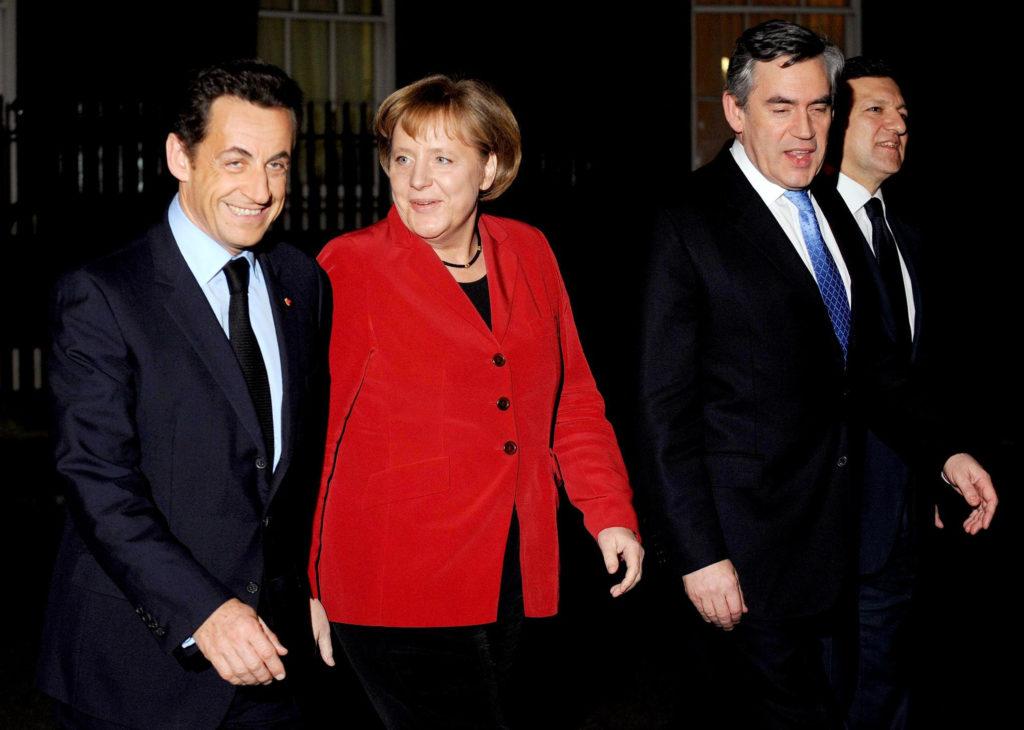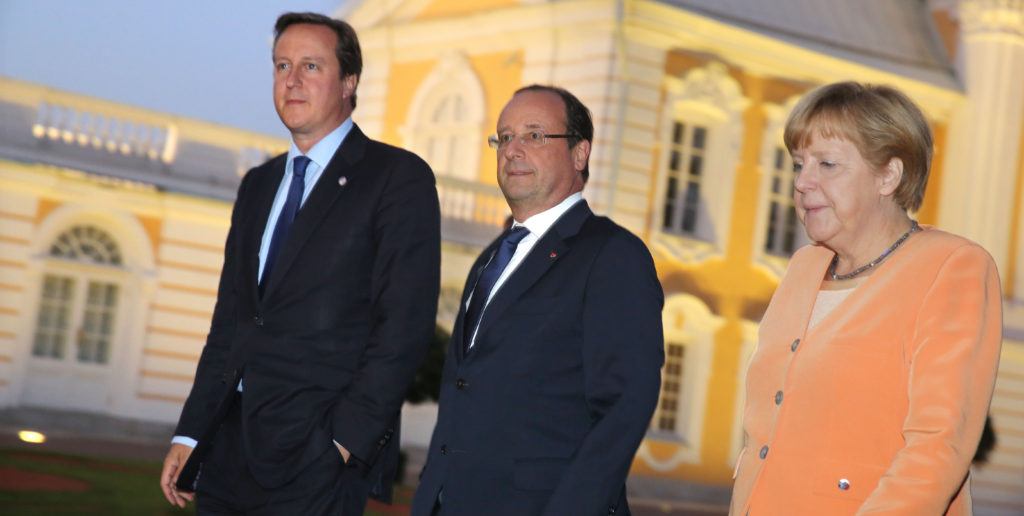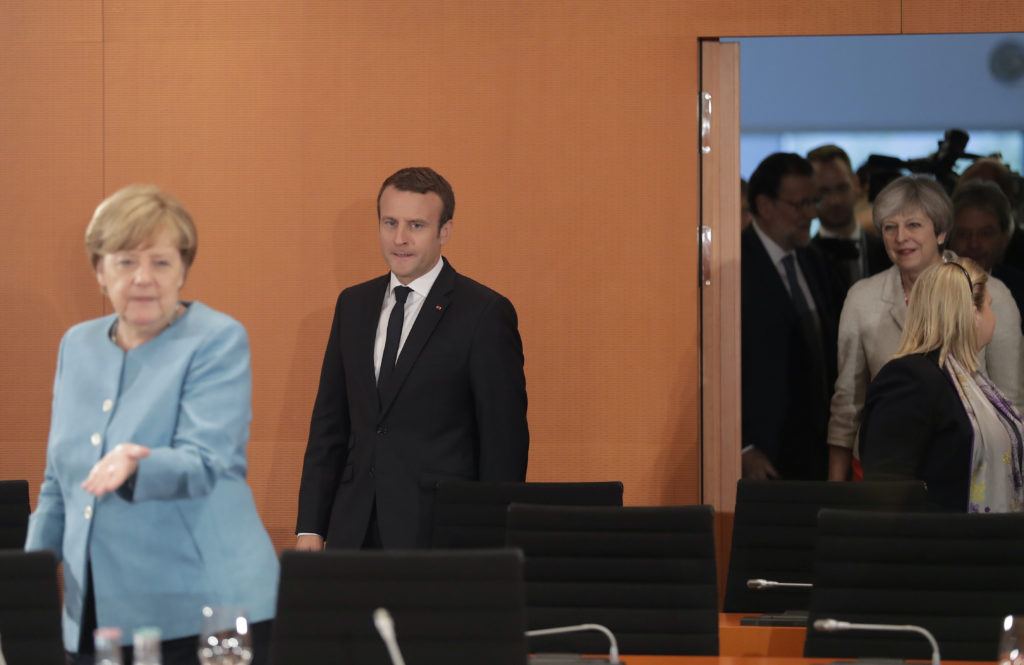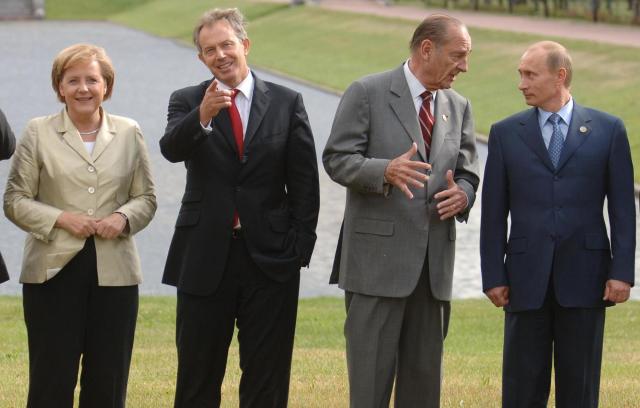Angela Merkel, Tony Blair, Jacques Chirac, and Vladimir Putin – Stefan Rousseau/PA Archive/PA Images

For all the feverish polls and fervid political analysis, every election boils down to one core issue: change or continuity. When people enter the booth to cast their vote they are confronted with the same choice regardless of the names before them: do you want to give the current gang another few years in charge or kick them out for that other bunch? Many factors inform the final decision, from economics and social concerns through to personalities, yet ultimately all feed into this simple question.
Since we live in tempestuous times, with many voters spooked by digital disruption, economic pessimism and the pace of globalisation, several key electorates have opted for change in recent ballots. We saw Brexit in Britain followed by the shock insurgencies of Donald Trump in the United States and Emmanuel Macron in France. These same undercurrents, fostered by uncertainty, fuelled a resurgence of dismal forces from the dark past with rampant nationalism rising on the right and a reinvigorated Marxism on the left.
Yet one nation seems largely immune to this infection. Angela Merkel took over at the helm of her party when Bill Clinton was US president, has been chancellor of Germany since Tony Blair was in Downing Street, steered her nation through the global financial crisis and is the longest-serving elected leader in the European Union. Yet even in this unpredictable age, it seems safe to conclude that – barring disaster of the type not usually associated with this cautious politician – the world’s most powerful woman is cruising towards her fourth election victory later this month.

Merkel’s achievement would be amazing in any age. But given intensity of the storms that are buffeting Western democracies, her latest triumph would be truly astonishing. With ten days of campaigning left, latest polling gives her centre-right Christian Democrats, including its more conservative Bavarian wing, a 16-point lead with a 38% vote share. The rival Social Democrats (SPD) were languishing on 22% in the most recent Forschungsgruppe Wahlen poll.
Yes, there is suspicion of polling and many voters are still making up minds. But if she wins again, how has this enigmatic woman defied a restless desire for change that has swept aside so many contemporaries? Not least when she divided both party and nation with that dramatic decision to take in one million refugees and migrants over the past two years. The SPD did close the gap for a brief period earlier this year, after selecting the folksy Martin Schulz, a former European parliament president, as its candidate for Chancellor.
Germany does, after all, share some of the concerns that sparked surging populism in other countries. Citizens may earn more than British or French workers but their incomes have stagnated over the past decade. The numbers at risk of poverty have risen. A sharp spike in part-time, low-paid and insecure work has provoked unease over inequality, something acknowledged even by Merkel, while critics say millions of these ‘mini-jobs’ are replacing secure and better-paid full-time posts. There have been deadly terror attacks and fierce debate over integration.

Yet this is an inherently conservative nation that prizes caution. Germany remains rich and competently governed, so Merkel has retained decent approval ratings. The economy seems strong with low unemployment, high consumer confidence and wages rising at last. The flicker of excitement over Schulz fizzled out fast as he failed to press home arguments while his party offers minimal change, seen in a dreary recent debate between leaders that highlighted the centrist consensus. Finally, the country feels like an island of stability in a sea of turbulence – and it knows better than most the terrible cost of extremism.
As others have pointed out, the great irony is that voters who are conservative by nature are set to again back a chancellor who unleashed the greatest change on their nation since the 1989 fall of the Berlin Wall. ‘Nobody would have believed that this rather reserved, calculating physicist would, based on a gut decision in September 2015, allow several months of largely uncontrolled immigration into Germany,’ wrote Die Zeit’s Jochen Bittner. Yet compared with some other global leaders, Merkel still seems solid and dependable – and besides, Germany has the world’s second oldest population so needed an infusion of youth.
Several years ago I spent time in Germany visiting her home town of Templin in former East Germany and talking to allies, friends and foes for a profile. Certain traits became clear: the determination drilled into Merkel by her pastor father to be best at everything; the ruthlessness seen when she knifed her mentor Helmut Kohl after he was snared in scandal; the sardonic sense of humour; the ability to control emotions and hide thoughts, essential in an autocratic state; and intense dislike for ideology, as distinct from ethics, after growing up under communism’s stifling grip.
Most significantly, she approaches politics and issues like a scientist, wrestling with each puzzle until she determines a path forward. She is less of a leader, more of a problem solver. This is why she follows opinion polls so assiduously, triangulates endlessly, prevaricates often and neutralises potential conflicts – as seen again with her recent shift on gay marriage. “She is a typical natural scientist, thinking slowly about the things to do then working out how to do it. If there are problems, she will solve them,” said one friend. “That’s a good way to operate in my view.”
Like several others, this person mentioned to me how Margaret Thatcher, another outstanding female politician, was also a trained scientist who understood the need for pragmatism. Even on the asylum issue, where Merkel showed moral leadership, she then moved to tame Alternative for Germany’s threat from the right by doing a deal with Turkey to stem flows of people, took a tougher line on rejected migrants and pushed newcomers to learn German. The fringe party, beset by infighting, look set to cross the five per cent threshold to win seats but seem unlikely to achieve much more for all their froth and fury.
Merkel is often seen as a sphinx, an inscrutable figure hard to fathom even after a dozen years in charge of Europe’s dominant country. But much of her longevity as leader is down to this under-rated political quality of pragmatism. Indeed, you could even argue she is an extremist in this respect, given the amazing lack of ideological baggage she bears in office. Interestingly this goes against the current vogue for politicians who are ‘authentic’ and stick to their principles – yet, as we shall almost certainly see again later this month, this scientific approach has proved immensely successful for the Iron Frau.











Join the discussion
Join like minded readers that support our journalism by becoming a paid subscriber
To join the discussion in the comments, become a paid subscriber.
Join like minded readers that support our journalism, read unlimited articles and enjoy other subscriber-only benefits.
Subscribe